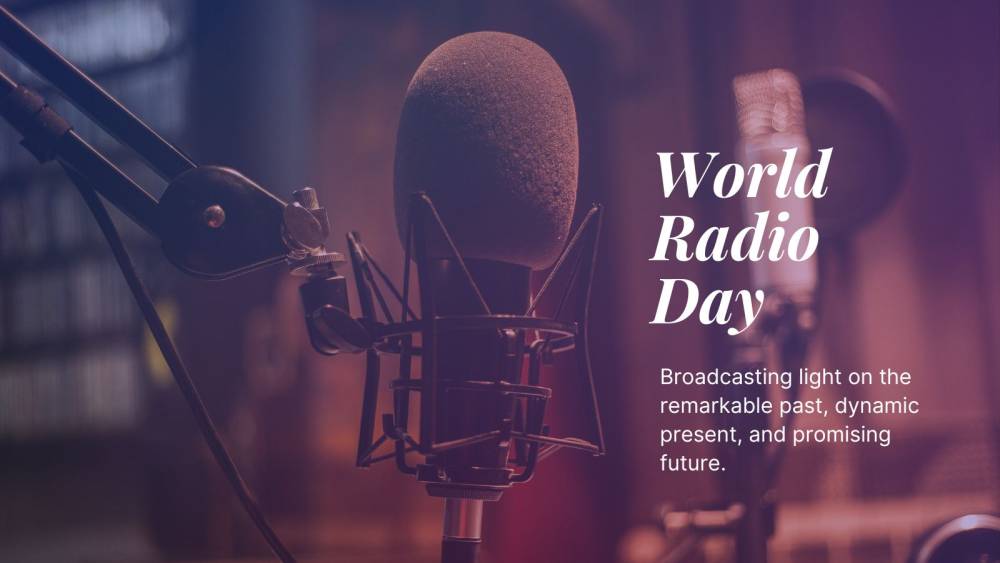World Radio Day- Broadcasting Light On The Remarkable Past, Dynamic Present And Promising Future

World Radio Day- Broadcasting Light On The Remarkable Past, Dynamic Present And Promising Future
UNESCO has earmarked today (February 13) as the world radio day. In commemoration, World Radio Day 2024 shines a broadcast light on the remarkable past, dynamic present, and promising future.
Despite brilliant media evolution and technological advancements, radio still stands as one of the most reliable and widely utilized forms of media. This is credited to its, affordability, effectiveness, and localness. In Kenya, radios are affordable and reach the most remote parts of the country. In addition, mobile phones (keypads and smartphones) are fitted with radio capabilities, advancing access to news and entertainment.
Largely, in the African community, radio is an important asset in spreading verified news, and entertainment and uniting communities in participatory segments.
In- dire times, there is a constant and pressing need for verified sources of news. According to a State Of The Media Report 2022, 74% of the surveyed participants said they rely on radio as a news source. For instance, when the pandemic struck, radio responded to the public’s thirst for information. Radio provided key information on vaccine roll-out, health measures, and updates on the roll-out for vaccines.
Presently, the rise of vernacular reaches all populations. Radio stations, true to their unparalleled broadcasting public good, provide access to development information in addition to news and entertainment. Fuelled by the demand and desire for knowledge, radio is a key source of information for various sources of life. Increased participation of rural and marginalized in content and feedback, strengthens relationships between the stations and their audience.
Radio Trends Kenya & Uganda
In Kenya, Radio is the 2nd most trusted source of news and entertainment despite changes in the media landscape. Concurrently, radio has the highest consumption in Uganda with 80% of the total media users having access to the platform.
Peak listening bands are from 6.00 am - 10.00 am and later go up from 4.00-9.00 p.m. which correlates with the majority of East Africans who listen to popular segments when commuting to and from work.
Radio Citizen and Radio Jambo stand out as the top listened-to radio stations both in 2021 and 2022 as national radio stations, while Uganda’s Eastern region has the highest number of radio users across the four regions.
Radio, has over the years controlled over 30% of advertising budgets in the media industry. However, in Uganda, the trend changed in 2023 as players in the Telecom and Beverage sectors heavily embarked on visual advertising during the period.
Kenya’s four of the top ten spenders on the radio were from the Betting & Gambling sector. Most of these companies' activities were aired during breakfast and mid-morning shows.
Radio: Fuelling The Problem
In today’s contemporary society, gambling is a social demand that influences a trigger of addiction problems, such as ludo pathy and domestic economic problems. Kenya is witnessing a surge in the mobile phone sports betting arena. Furthermore, SMS-based lottery games are prominent in the radio scene within watershed hours.
Kenya has the highest percentage of young gamblers in Africa at 76% who on average spend more compared to South African and Nigerian peers in the continent. Gambling’s gratification has been proven to spark the brain’s reward system like drugs or alcohol, leading to compulsiveness. Media houses have turned lottery games into a significant source of income, despite the Programming Code seeking to ensure that unsuitable material for children and minors is not broadcast at times when there is likely to be a large audience of young listeners or viewers.
This model remains to be an ethical and operational issue influencing unwary and impressionable minds. Regardless, radio plays a significant role in societal development. We can turn the volume down on unethical practices through:
●Stricter regulations: Governments tightening control on advertising content, especially for sensitive industries.
●Industry self-regulation: Media houses adopt stricter ethical codes to prioritize responsible advertising.
●Media literacy programs: Educating communities to navigate the media landscape with critical thinking skills.
Learn in-depth insights on the current radio landscape in Kenya and Uganda. Get your copy.